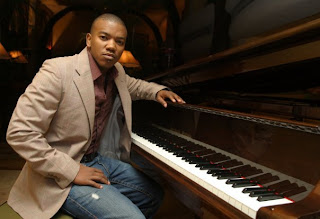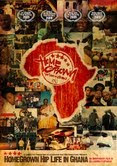One of the many faceless beat makers and producers who shuns the glare of publicity but whose handprints can be found on many chart-topping tracks is Eric Kwabena “Coptic” Matlock. This Ghanaian born New York-based beat genius and producer is one of the most sought-after in this hyper-competitive genre of music. His body of work reads like the who’s who of the hip-hop industry. Coptic experienced his first breakout hit producing Puff Daddy's "I Need a Girl" (Part 1) featuring Usher and Loon which peaked at # 2 on Billboard Hot 100, and most recently a featured producer on "B.I.G Duets: The Final Chapter" with his track "Wake Up" featuring Korn. I learned about Coptic whilst interviewing another Ghanaian artiste David Mensah, whose debut album “Food is Love” had a couple tracks produced by Coptic. A fortnight ago, I made Coptic’s acquaintance and asked for an interview, which he quickly granted. The 40 minute on-air interview which resulted covered an array of subjects from his early life as a DJ, his time at the Bad Boy Records Label and his current project, the Black Star Line album-Close To My Roots. Here is a partial transcript of the interview.
Q: We’re welcoming Eric Coptic Matlock, a prominent producer and beat maker in hip-hop circles, as well as CEO of his own Brooklyn Bridge Entertainment and African Rebel Music Label. Coptic, can you tell us a little about your background?
ECM: I‘m a young man from Ghana, West Africa. I was born in Awukugua in the Akwapim Mountains in the Eastern Region. I grew up in Accra and always had a love for music from an early age. I moved to the US when I was 13 and was attracted to hip-hop music. I started producing records, which in time led to projects for Puff Daddy and Biggie Smalls. So in a nut shell that is who I am.Q: How did you get into producing music and what was your first breakout opportunity?
ECM: Well, I earlier stated I always had a love of music. My mother always told me that as a child I would occasionally arrange and beat on my grandmother’s pots. At the age of ten, I joined a local band when living in Newtown, a suburb of Accra where I played the base drum and some percussion instruments. When I moved to the States, I deejayed for a while and started getting involved in hip-hop music. So I realized I could do it and sought out seasoned individuals such as Amos Sackey who mentored me and taught me how to produce a track. I was also fortunate to meet and become friends with True Master (with Wu-Tang Clan) who gave me a few tips and spent 3 years learning the rudimentary aspects of music production. About a year later David Best, a boyhood friend of mine introduced me to one his friends, Harvey Pierre (then an A&R for Biggie Smalls).He loved what I had to offer and encouraged me to improve my craft. Harvey later introduced me to Derrick “D-Dot” Angeletti, an A&R and producer on Puffy’s Mo Money, No Problems and Benjamins. He would in turn introduce me to Jermaine Dupri and D-Mob. He will later play my track for the big stars whenever they come down to the label’s office or studio. So that’s how I got into the music business, and therefore consider myself pretty lucky. My big break came with Jermaine Dupri’s “All that’s Gotta go” (featuring Da Brat). It is worth noting that I have sold more tracks than have been released. In this business, sometimes your production work is purchased but might be shelved for any number of reasons. So that’s how it all got started.
Q: Recently, you embarked on a project to pair rappers/singers from both sides of the Atlantic (African and American), The Black Star Line Album. Could provide us with some insight on this undertaking?
ECM: The Black Star Line project is focused on African rappers/singers blended with American artistes. The goal is to bring these artistes to the attention of the American public, and the African audience to see their own in a different light. It has artistes from Ghana, Egypt, Morocco, Tanzania, Ethiopia, Senegal, South Africa and Zimbabwe. Until these artistes become part of mainstream in American, they will not be well compensated for their work. Based on the success of this album, I am planning on scheduling a tour for a few of the artistes to some African countries. There will be no personal financial gain to be made from this album because all monies raised will go towards purchasing instruments for kids in Africa. All the artistes featured, including the Americans donated their time and effort towards this album. So your support is really needed.
Q: In your business dealings you have signed a long-term publishing agreement covering both your existing catalog of works as well as future songs. This is an aspect of the music business that generates the artiste a substantial amount of money. The music of Ghanaian and some African artistes are played on stations and used by the Telecom companies without any royalties being paid for the use of their materials. In your view, do you think this aspect of the music business is not given particular attention by Ghanaian and African musicians and what can be done to address this anomaly?
ECM: Definitely, worldwide except from most parts of Africa I receive royalty payments for my works. The copyright laws are adhered to in the rest of the world. For some reason in Ghana and some parts of Africa, the laws are not enforced which is to the detriment of the music industry as a whole. The works of artistes that is used in a commercial sense (i.e. video games, commercials and on major T.V networks) have to be paid for because this keeps the musicians and the producers going. I know artistes that have hit records and are not properly compensated. The only way African artistes are making money is by working out endorsement deals with the Telecom companies and doing shows. This situation in effect short changes the artistes because it keeps money out of their pockets and leaves them with a small budget for the next project. In Ghana, there is supposed to be an organization(COSGA) that is tasked with collecting these funds from the media and Telecom companies, unfortunately there is an element of political interference in play here. The support system in Africa for these musicians has to change!
Q: You recently debuted two promotional tracks off the soon-to-be released Black Star Line Project featuring Kwaw Kesse(Ghana) and Eddie Atlas(Uganda). How has the promotional material been received by audiences?
ECM: It has been very well received. The reactions have been overwhelmingly positive. I feel like the people that actually downloaded the two free tracks loved it. I've heard very few people criticize it; it's had the best reviews in the press that I've ever had with any other record. I feel that music lovers would buy the full-length album when eventually released and would really enjoy it.
Q: Is there an artist you want to work with that you have not yet had the opportunity to work with?
ECM: I would definitely love to work with Hugh Masekela, Alpha Blondy and Jay Z. These are guys I really admire and will look forward to working with them in the future.
Q: What projects are you currently working on?
ECM: I am currently the A&R for Black Rob’s new LP to be released early next year on DuckDown records. I am also in the process to producing Tek from Smif-n-Wessun’s next solo album which will be released sometime next year.
Q: What are your long-term career goals?
ECM: I have plans to retire to Ghana in 7-10 years. My goals will be to set up a major studio in Ghana to record from and to teach aspiring producers how to produce and record quality records. I am also interested in exploring other entertainment-based businesses in Ghana.
Q: How can prospective artistes/rappers contact you for production support?
ECM: I can be reached on FaceBook by looking up Coptic Sounds. Alternatively, I can be contacted too on the website www.TheBlackStarLine.com where they register/join it. With that website they can submit their videos and tracks, where I can listen to their work and critique it. If their work is very good, who knows they can end up on an album!
Well, Coptic, thank you very much for granting us this interview. Thanks for your time and patience and we wish you continued success with the commendable work. Well, guys, there you have it: our first interview with Brooklyn Bridge Entertainment and African Rebel Musik label’s CEO, Eric Coptic Matlock.
The Afrikan Child © Copyright 2010. All Rights reserved. No part of these pages, either text or image may be duplicated without the author's permission. Also, reproduction, modification, storage in a retrieval system or retransmission, in any form or by any means, electronic, mechanical or otherwise is strictly prohibited without prior written permission. General inquiries should be directed to our Web feedback box, accessible from this link or from the footer at the bottom of most pages on our site.









